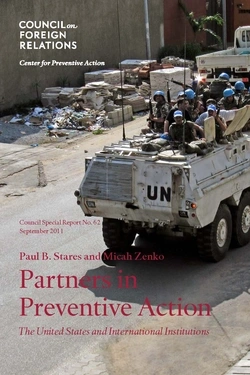
Partners in Preventive Action
The United States and International Institutions

- Council Special Report
- Concise policy briefs that provide timely responses to developing crises or contributions to current policy dilemmas.
Overview
The unipolar moment, to the extent it ever existed, has now truly passed. The United States is part of a globalized world, in which the flows of goods, finance, people, and much more connect us to other countries as never before. But for all the myriad benefits globalization brings, it also means that the challenges of the coming decades—be they generated by resource competition, climate change, cybercrime, terrorism, or classic competition and rivalry—cannot be solved or even mitigated by one country alone. Countries will need to cooperate on policies that extend across borders to address issues that affect them all.
In this Council Special Report, CFR scholars Paul B. Stares and Micah Zenko argue that the United States should increasingly look to international institutions—the United Nations and regional organizations like the European Union, the African Union, and the Association of Southeast Asian Nations—as partners in conflict prevention and peacemaking worldwide. These organizations can serve as a platform for developing and enforcing international norms; provide a source of legitimacy for diplomatic and military efforts; and aggregate the operational resources of their members, all of which can increase the ease and effectiveness of American peacemaking efforts.
The CSR explores the ways these institutions are already contributing to the creation and maintenance of peace, from the UN's conflict monitoring systems to the dispute resolution mechanisms at the Organization of American States and the nascent African Standby Force of the African Union, before turning to a series of recommendations on ways the United States can improve its interaction with these institutions and maximize their potential.
More on:
To reduce the risk of conflict, the authors write, the United States should work to expand and institutionalize international norms against both intra- and interstate violence. They also suggest that the United States further efforts toward economic growth and good governance in the developing world, both of which reduce the potential for conflict, and work to institutionalize a limited form of the responsibility to protect. To head off brewing conflicts, the authors recommend closer cooperation among the United States and international institutions on conflict monitoring and intelligence sharing, coordination on aid disbursements, and increasing American representation on and funding to bodies working in these areas. And where conflict has already broken out, they note, the United States could still enable a rapid response by enhancing international capacity to quickly deploy civilian and military assets to new conflict zones.
Partners in Preventive Action raises important issues for U.S. policymakers contemplating a world of increasing complexity at a time of decreasing means. It provides a comprehensive look at the conflict prevention capacity of international institutions and poses thoughtful recommendations on how they can be improved. While there will continue to be a place for independent action, ad hoc coalitions, and formal alliances, this CSR successfully argues for the present and future importance of international institutions.
More on:
 Online Store
Online Store